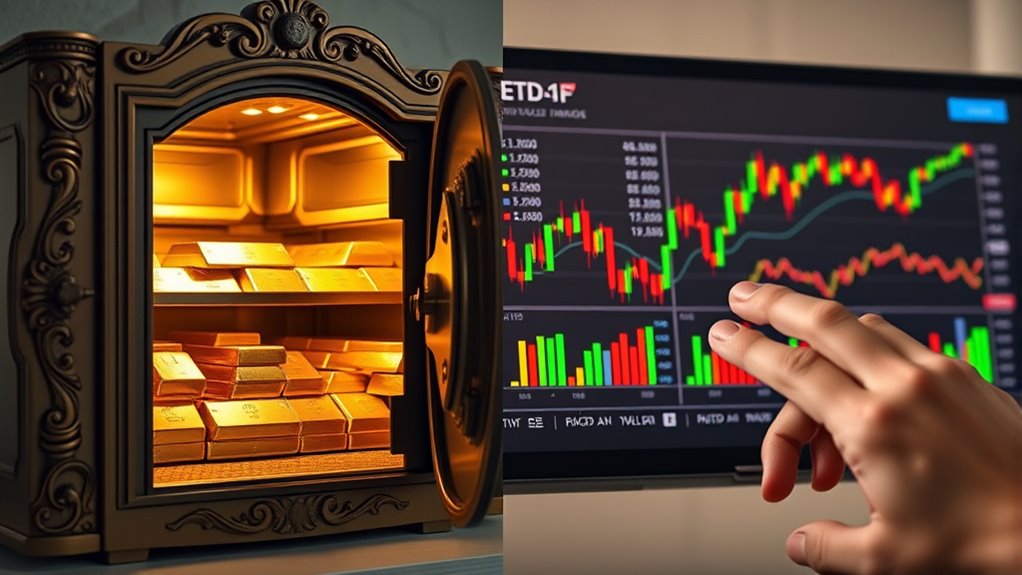A Gold IRA is a self-directed account where you own physical gold stored securely, offering tax benefits but with limited access and higher fees. In contrast, a Gold ETF pools investors’ money to buy gold, allowing you to buy and sell shares easily during market hours, usually at lower costs. The choice depends on whether you prefer long-term tax advantages or flexible, quick transactions—keep exploring to understand which suits your investment style best.
Key Takeaways
- Gold IRAs involve direct ownership of physical gold stored securely, offering tax advantages and long-term growth potential.
- Gold ETFs are pooled investment funds owning gold, allowing quick buying and selling with higher liquidity and flexibility.
- IRAs are tax-deferred accounts with restrictions on access and withdrawals, while ETFs are taxed annually on gains and dividends.
- The cost structure differs, with IRAs incurring custodial, storage, and setup fees, whereas ETFs usually have lower expense ratios and brokerage costs.
- IRAs suit long-term investors seeking tax benefits, while ETFs are better for those prioritizing liquidity, ease of trading, and lower costs.
Structure and Ownership of Investments

When comparing a Gold IRA and a Gold ETF, understanding their structure and ownership is essential. A Gold IRA is a self-directed retirement account that holds physical gold stored in a secure facility, and you own the assets directly through the account. It’s a legal entity governed by IRS rules, offering tax advantages. In contrast, a Gold ETF is a fund that owns gold, but you don’t hold physical gold yourself. Instead, you buy shares in the ETF on the stock market, making it a pooled investment. The ETF is managed by a fund company, and your ownership is limited to shares, not the actual gold. This fundamental difference affects how each investment is held, secured, and taxed, shaping your overall investment strategy.
Accessibility and Liquidity

Accessibility and liquidity are key factors to contemplate when choosing between a Gold IRA and a Gold ETF. With a Gold IRA, your access is limited to specific custodians and approved transactions, meaning you can’t frequently buy or sell gold outside the designated plan. Liquidity tends to be lower; selling your holdings may take time and involve certain restrictions. In contrast, a Gold ETF offers much greater accessibility—you can buy or sell shares through your brokerage account almost instantly during market hours. Liquidity is high, often allowing you to liquidate your investment within minutes, making it easier to adapt to market changes or cash needs. Additionally, the market volatility associated with ETFs can provide opportunities for quick profits or timely exits, depending on market conditions. Understanding the investment type you choose may also influence your overall financial planning and diversification strategy. Market trends and economic indicators can also impact the performance of both options, helping you make more informed decisions about your investment portfolio. Your choice depends on whether you prioritize quick access and flexibility or are comfortable with more limited, long-term investment options.
Tax Implications and Regulations

Tax implications and regulations substantially influence your decision between a Gold IRA and a Gold ETF. With a Gold IRA, you benefit from tax-deferred growth, meaning you won’t pay taxes on gains until you withdraw funds, often during retirement. However, early withdrawals can incur penalties and taxes. In contrast, Gold ETFs are taxable in the year you sell or receive dividends, usually resulting in more immediate tax obligations. ETFs typically offer more flexibility with fewer restrictions, but you may face capital gains taxes each year. Additionally, IRAs have strict IRS rules regarding storage and custodianship, while ETFs are governed by securities regulations. Your choice depends on your tax strategy, retirement plans, and willingness to comply with specific regulations.
Investment Costs and Fees

Investment costs and fees can particularly impact your overall returns when choosing between a Gold IRA and a Gold ETF. With a Gold IRA, you’ll encounter setup fees, annual custodial fees, storage costs, and potential transaction charges. These expenses can add up over time, reducing your gains. Conversely, Gold ETFs typically have lower expense ratios, meaning you’ll pay a small percentage annually to cover management costs. However, you might face brokerage commissions each time you buy or sell ETF shares. While ETFs often have lower ongoing costs, the fees for a Gold IRA tend to be higher due to administrative and storage services. Additionally, understanding the custodian services involved can help you better estimate the total expenses associated with a Gold IRA. Considering the storage options is also crucial, as different storage methods can significantly affect your overall costs and security. Furthermore, the regulatory compliance requirements for IRAs can influence the complexity and potential costs of maintaining your account. Being aware of transparency of fees can help you make more informed investment decisions. Awareness of insurance coverage for stored assets can also influence your security and cost considerations over time.
Suitability for Different Investors

Choosing between a Gold IRA and a Gold ETF depends largely on your investment goals, risk tolerance, and financial situation. If you’re looking for long-term growth and prefer tax advantages, a Gold IRA might suit you better, especially if you’re comfortable with the added complexity and minimum investment requirements. On the other hand, if you want liquidity, flexibility, and lower costs, a Gold ETF could be more appropriate, fitting well into a diversified portfolio. Your risk appetite also matters—IRAs involve more regulatory considerations, while ETFs are more straightforward and traded like stocks. Consider how hands-on you want to be and your timeline for investing. Additionally, understanding angel number soulmate concepts can inspire a more intuitive approach to your investment decisions by aligning your goals with your personal growth and spiritual insights. Recognizing investment options and their unique features can further help you make an informed choice aligned with your financial journey. It’s also beneficial to research the differences in structure to understand how each option operates within the broader market landscape. Being aware of the cost structures associated with each investment type can help in assessing their long-term viability and impact on your returns. Moreover, understanding regulatory considerations can help you navigate potential legal and tax implications associated with each investment vehicle.
Frequently Asked Questions
Can I Convert My Gold IRA Into a Gold ETF Later?
You can convert your gold IRA into a gold ETF later, but it involves some steps. First, you need to liquidate your IRA holdings, which may have tax implications or penalties if you’re under 59½. Then, use the proceeds to buy shares of a gold ETF through your brokerage account. Keep in mind, this process may take time and could impact your investment strategy. Always consult a financial advisor before making such moves.
What Are the Storage Options for Physical Gold in a Gold IRA?
You have several storage options for physical gold in a gold IRA. Most commonly, you choose a secure, IRS-approved custodian who stores your gold in a reputable depository. You won’t handle the gold directly, ensuring safety and compliance. Some custodians offer allocated storage, where your gold is individually owned, while others provide unallocated storage, which is pooled. Always verify that your storage method meets IRS standards for security and compliance.
Are There Minimum Investment Amounts for Gold ETFS?
You might wonder if there’s a minimum investment for gold ETFs. Generally, there isn’t a strict minimum; you can buy as little as one share through most brokerages. However, some platforms might require a minimum deposit or trading amount. It’s best to check with your broker for specific requirements. Keep in mind, purchasing more shares can sometimes lower your overall transaction costs.
How Does Inflation Impact Gold IRA Versus Gold ETF Investments?
Inflation affects both Gold IRAs and Gold ETFs by increasing gold’s appeal as a hedge. With a Gold IRA, your investment grows tax-deferred, potentially protecting your retirement savings from inflation. Gold ETFs offer liquidity and easy access, allowing you to quickly respond to inflationary pressures. In both cases, rising inflation can boost gold’s value, but your choice depends on whether you prefer long-term retirement growth or flexible, accessible investing.
Which Option Offers Better Long-Term Growth Potential?
Imagine your investment journey as a tree growing over time. You want steady, strong growth. A Gold IRA offers tax advantages and long-term security, helping your tree flourish with minimal disturbances. A Gold ETF, on the other hand, provides liquidity and quick access, but may lack the stability for sustained growth. For long-term potential, your choice should align with your growth goals and risk tolerance.
Conclusion
Think of choosing between a Gold IRA and a Gold ETF like picking between a sturdy boat and a speedboat. Both get you across the river, but one offers stability, while the other provides quick thrills. Whether you’re in it for long-term security or fast access, understanding these differences helps you navigate your investment journey. Make an informed choice, and you’ll steer your financial future with confidence—just like knowing when to sail steady or speed ahead.










